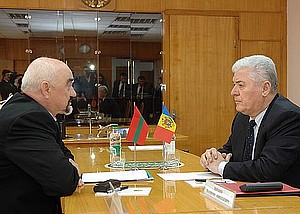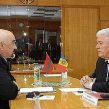
Moscow, Tiraspol Sidelining the West From Negotiations on Transnistria Conflict
Publication: Eurasia Daily Monitor Volume: 6 Issue: 61
By:

The joint declaration by Russian President Dmitry Medvedev, Moldovan President Vladimir Voronin, and Transnistria leader Igor Smirnov, signed in Moscow on March 18 (EDM, March 20, 25, 26), is serving Smirnov well as a negotiation-breaker. Citing points in that declaration, Smirnov is now calling openly for marginalizing or bypassing Western participants in the negotiating process, which Moscow and Tiraspol -or the latter fronting for the former- had already brought to a deadlock.
Tiraspol has drawn even more encouragement from the Moscow meeting. Interviewed in Nezavisimaya Gazeta afterward, Smirnov revealed that he (on a par with Voronin) held a 40-minute personal meeting with Medvedev in Moscow, following which he concluded: "Things are better under Medvedev than under Putin" for Transnistria. From that meeting, Smirnov has inferred that Medvedev supports not only the perpetuation of Russia’s military presence in Transnistria, but turning the area into a Kaliningrad Oblast-type entity as "Transnistria-Russian region."
Based on his meeting with the Russian president, Smirnov expects the U.S. to tolerate or passively acquiesce in that Russian policy: "We are counting on the change in relations between Washington and Moscow. In one of the documents signed under Obama, the Americans virtually recognize Transnistria as a Russian zone of influence. That is to say, Russia’s right to oversee what happens in former Soviet republics is recognized." Whether deliberately or inadvertently, Smirnov’s words challenge Washington to deny the Medvedev-Smirnov version and set the record straight.
The U.S. has noticeably reduced the level of its interest and participation in the negotiations on the Transnistria conflict during the last year or so. Formerly represented at the level of Deputy Assistant Secretary of State, Washington has informally ceded to the European Union the leading role on the Western side in these negotiations.
The EU’s negotiator on this conflict, Kalman Mizsei, has brought an unprecedented level of energy and resourcefulness to this once-lethargic mission. Mizsei’s term comes up for regular annual prolongation, but Tiraspol (and presumably with Moscow behind it) would like the EU to replace him. This is the meaning of Smirnov’s dismissive line about Mizsei: "Who is he to Transnistria? A nobody, a zero." By insinuating that the negotiator has become totally unacceptable to one of the parties to the conflict, Tiraspol hopes to induce some within the EU to question this diplomat’s continuing usefulness. Mizsei, however, had simply restated EU policy -infuriating Smirnov and his handlers- that the EU would only recognize solutions reached in the international negotiating format, rather than the Moscow meeting’s format (Nezavisimaya Gazeta, March 23).
On March 24 Smirnov called a press conference to announce that Mizsei as well as the U.S. and Czech ambassadors to Moldova, Asif Chaudhry and Petr Kypr -the latter representing the EU’s current presidency- have been banned from entering Transnistria. Ostensibly, the move responds to the EU’s decision to prolong its ban on 19 Transnistria officials, who are being denied entry into EU territory. The EU interdiction, however, has been in effect since 2003 and was prolonged in mid-February of this year. Tiraspol took six weeks to retaliate in the way it has, apparently assured of support in Moscow following the Medvedev-Smirnov meeting.
In that same press conference Smirnov offered basing rights for Russian troops in Transnistria. He cited Transnistria’s "legislation" allowing for this possibility (Interfax, RIA Novosti, March 24). Russian troops currently stationed in Transnistria do not have basing rights or any legal status.
Smirnov also announced that Medvedev has pledged $200 million worth of supplementary assistance to Transnistria for 2009, up from $104 million last year. The lion’s share of those funds are said to be earmarked for Russian-owned industrial plants in Transnistria (Interfax, March 24, 27). Meanwhile, Transnistria’s arrears to Gazprom have reached $1.8 billion, according to official data released on the occasion of the March 18 Moscow meeting (Interfax, March 18, 19). Gazprom and the Russian government have long ago given up on collecting Transnistria’s debts.
On March 26 Tiraspol’s "foreign minister" Vladimir Yastrebchak in a press conference assailed the EU and the U.S. for having encouraged Moldova to reject the Kremlin’s 2003 Kozak Memorandum, supporting Chisinau’s 2005 law on Transnistria’s autonomy within Moldova, and otherwise applying "pressures" on Transnistria. Consequently, the EU and U.S. "do not fulfil the prerequisites" for an upgrade of their status, from observer to mediator, in the international negotiations on Transnistria (Novyi Region, March 26).
Moscow almost certainly orchestrated this affront to Brussels and Washington, suggesting that Russia need not bother thwarting them; a mere "foreign minister" in Tiraspol can do that just as easily. Yastrebchak’s statement is also an affront to Voronin, who had personally rejected the Kozak plan and had proposed the 2005 law to parliament for ratification. The apparent message is that Voronin (or his successor) would have to reverse those decisions in order to unfreeze the negotiations; and even then, without prejudice to Moscow’s and Tiraspol’s ultimate goals: a Transnistria remote-controlled by Russia and "guaranteed" by Russian troops in place.




